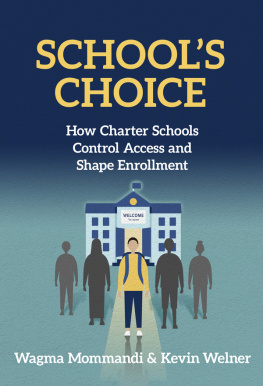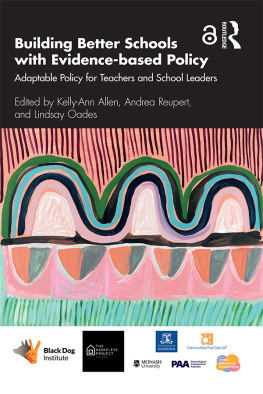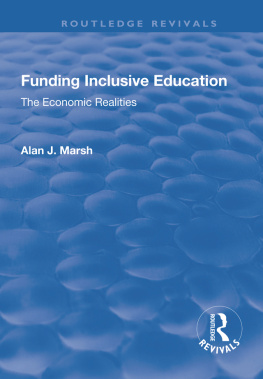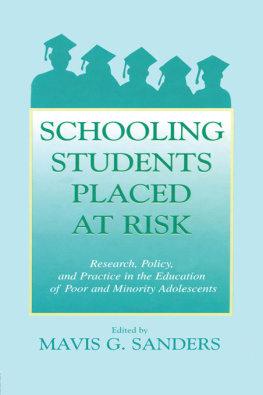POLICY AND POLITICS IN EDUCATION
Policy and Politics in Education
Sponsored grant-maintained schools and religous diversity
Geoffrey Walford
First published 2000 by Ashgate Publishing
Reissued 2018 by Routledge
2 Park Square, Milton Park, Abingdon, Oxon OX14 4RN
711 Third Avenue, New York, NY 10017, USA
Routledge is an imprint of the Taylor & Francis Group, an informa business
Copyright Geoffrey Walford 2000
All rights reserved. No part of this book may be reprinted or reproduced or utilised in any form or by any electronic, mechanical, or other means, now known or hereafter invented, including photocopying and recording, or in any information storage or retrieval system, without permission in writing from the publishers.
Notice:
Product or corporate names may be trademarks or registered trademarks, and are used only for identification and explanation without intent to infringe.
Publishers Note
The publisher has gone to great lengths to ensure the quality of this reprint but points out that some imperfections in the original copies may be apparent.
Disclaimer
The publisher has made every effort to trace copyright holders and welcomes correspondence from those they have been unable to contact.
A Library of Congress record exists under LC control number: 00134476
ISBN 13: 978-1-138-73646-7 (hbk)
ISBN 13: 978-1-315-18595-8 (ebk)
Empirically based educational research is far from being a solitary activity. It is only possible because of the help and support given by colleagues, institutions, gate-keepers and those whose activities are the subject of the research.
1 have been particularly fortunate in the support that I have been given by all of these groups. At the Department of Educational Studies, University of Oxford, there has been plenty of encouragement and firm collegiality, while the University Research Board provided part of the necessary funding. Preliminary research for this book was undertaken whilst I received a grant from the Nuffield Foundation, and the most recent work was partly supported by the Spencer Foundation. I am particularly grateful to Ruth Deakin for her help throughout this research, to the Christian Schools Trust and to the Association of Muslim Schools.
Wordprocessing allows a mosaic to be formed from previous fragments. These can be embedded within new cement to make a coherent picture. While there is much that is new and previously unpublished in this account, it also draws upon my earlier published works. I acknowledge with thanks the publishers of some of my previous articles and book chapters for allowing me to reuse sections from those publications within this book.
Various chapters draw on sections from:
Geoffrey Walford (1995a) 'The Christian Schools Campaign- a successful educational pressure group?' British Educational Research Journal, 21, 4, pp. 451-464;
Geoffrey Walford (1995b) 'The Northbourne amendments: Is the House of Lords a garbage can?' Journal of Education Policy, 10,4, pp. 413-425;
Geoffrey Walford (1996b) 'School choice and the quasi-market in England and Wales.' In Geoffrey Walford (ed.) School Choice and the Quasi-Market (Wallingford, Triangle) pp. 49-62;
Geoffrey Walford (1997a) 'Sponsored grant-maintained schools: extending the franchise?' Oxford Review of Education, 23, 1, pp. 31-44;
Geoffrey Walford (1998) 'Reading and writing the small print: The fate of sponsored grant-maintained schools.' Educational Studies, 24, 2, pp. 241-257:
Geoffrey Walford (1999) 'Educating religious minorities within the English state-maintained sector.' International Journal of Educational Management, 13, 2, pp. 98-106.
Geoffrey Walford (2000a) 'A policy adventure: sponsored grant-maintained schools' Educational Studies , 26, 2, pp. 269-284;
Geoffrey Walford (2000b) 'From City Technology Colleges to sponsored grant-maintained schools.' Oxford Review of Education, 26, 2, pp. 145-158.
I am most grateful to these Journals for allowing me to reuse this material in this way.
Few may have yet noticed its significance, but 1998 marked a decisive turning point in the state funding of schools in England and Wales. In early 1998 the new Labour government decided that it would give grant-maintained status to two Muslim primary schools and one Seventh Day Adventist secondary school.
The numbers of children involved in these three schools is tiny, but the importance of this policy decision cannot be underestimated. It marks a new attitude towards minority religious and ethnic group schooling for which many have campaigned for decades and will be undoubtedly seen as one of the key educational policy-decisions of Labour's first five years.
This book examines the sponsored grant-maintained schools initiative which was the second attempt by a Conservative government to increase the 'supply-side' of the educational 'market-place'. These schools were an attempt to increase the diversity of schools within the state-maintained sector such that families would have a greater choice from which to select the most desirable school for their children. In outline, sponsored grant-maintained schools were a special type of grant-maintained school where groups of promoters could propose the establishment of a new school which, upon acceptance by the Secretary of State for Education and Employment, would be fully funded by the state, but which would be owned by non-profit charitable trusts. The policy was designed to allow some existing fully private schools to enter the state-maintained sector and for entirely new schools to be built by charitable trusts with the assistance of capital part-funding from the government and then full recurrent funding once the schools had been established. The key difference between these schools and others was that the Act allowed a greater diversity of schools to be established, for the Trusts could propose schools for different faiths and different teaching philosophies. England and Wales could have, for example, Muslim schools. Seventh Day Adventist schools or evangelical Christian schools for the first time. Sponsored grant-maintained schools thus marked a new direction in the diversification of schools available and in the government's policies on school choice.
It will be shown that the Sections in the 1993 Education Act that relate to sponsored grant-maintained schools were the result of a long period of pressure group politics which, in the end, met a favourable response from the then Secretary of State for Education, John Patten. The Christian roots of much of this pressure group activity and his desire to broaden 'choice and diversity' in schools led to his enthusiastic support for the idea. However, his zeal for the policy was not matched by that of Gillian Shepard who replaced him as Secretary of State in July 1994. Her concerns were focused increasingly on 'value for money', such that any potential new schools were forced to meet strict financial and demand-led criteria. Few proposers of schools were able to meet these criteria, so that by the time of the 1997 General Election the policy had become one similar to extending a rigidly enforced franchise rather than one that encouraged the development of choice and diversity.









